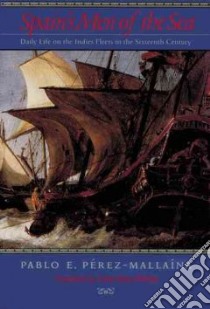Spain's Men Of The Sea - 9780801881831
Un libro in lingua di Perez Mallaina Pablo E., Phillips Carla Rahn (TRN) edito da Johns Hopkins Univ Pr, 2005
- € 26.20
- Il prezzo è variabile in funzione del cambio della valuta d’origine
In the sixteenth century, Spain's control over its vast New World empire depended on the sailors and officers who manned the galleons and merchant vessels of its Atlantic fleets. In Spain's Men of the Sea, Pablo E. Pérez-Mallaína paints a stunning portrait of daily life aboard the ships of the Spanish Main. With a novelist's eye for both detail and drama, Pérez-Mallaína evokes the golden age of seafaring in this thoroughly researched and generously illustrated account.
Spain's Men of the Sea begins in Seville, the gateway to the New World. One of Europe's most cosmopolitan cities, Seville attracted people and goods from around the world. From Seville, Pérez-Mallaína follows the Spanish fleets to the West Indies ports of San Juan de Ulda, Veracruz, Cartagena, Nombre de Dios, Portobelo, and Havana. He profiles the men and boys who went to sea—from the scions of seafaring dynasties and fugitives from justice to the orphans and destitute children apprenticed into service as cabin boys. Some signed on because of family tradition, more signed on because of the lure of New World treasure or simply to obtain free passage to the Americas. Most sailors were poorly paid, but the more enterprising among them supplemented their meager wages by small-scale trade or smuggling. Pérez-Mallaína also describes relations among the ship owners, officers, and crews, and traces the intervention of the Spanish government in disputes over pay and cases of insubordination and mistreatment.
Pérez-Mallaína paints a bleak picture of life at sea and its physical and mental effect on seamen and passengers alike. The seafaring life was defined by cramped quarters, abominable food, seasickness, vermin infestation, and disease. More frightening still was the threat of shipwreck and assault by corsairs and pirates that accompanied all sea voyages. Not surprisingly, most sailors were highly superstitious, and Pérez-Mallaína closes his vivid study with an exploration of their unorthodox religious beliefs, which combined Christian and pagan elements. A significant contribution to maritime history, Spain's Men of the Sea also succeeds as a compelling tale of everyday life and death in the maritime community.
"Pérez-Mallaína writes well and has an engaging sense of humor. The work is richly illustrated, and the illustrations, including many color plates, are well chosen... This book should appeal to all aficionados of the romance of the sea as well as to specialists in Spanish and Latin American colonial history."—Benjamin Keen, author of A History of Latin America
Informazioni bibliografiche
- Titolo del Libro in lingua: Spain's Men Of The Sea
- Sottotitolo: Daily Life On The Indies Fleets In The Sixteenth Century
- Lingua: English
- Autori : Perez Mallaina Pablo E., Phillips Carla Rahn (TRN)
- Editore: Johns Hopkins Univ Pr
- Collana: Johns Hopkins Univ Pr (Paperback)
- Data di Pubblicazione: 25 Febbraio '05
- Genere: HISTORY
- Pagine: 290
- Dimensioni mm: 222 x 146 x 19
- EAN-13: 9780801881831


